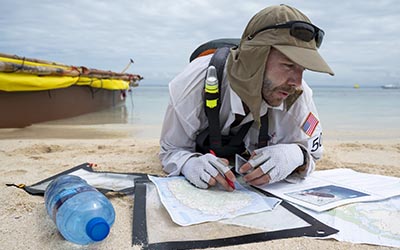Campus News
Rising to the Eco-Challenge
Two Slug alumni were part of a grueling, 11-day, 416-mile adventure race called Eco-Challenge Fiji, caught in a 10-episode series streaming on Amazon Prime.

Team Curl from the United States (team members Jennifer Hemmen, Justin Smith, Brett Gavlin, Steven Lenhart and Jeff Failers) compete in the 2019 Eco-Challenge adventure race in Fiji on Sunday, September 7, 2019. (Idris Solomon/Amazon)


UC Santa Cruz alums Justin Smith and Brett Gravlin had already paddled 40 muscle-draining miles across the open ocean in an outrigger canoe when things got even tougher.
That’s when the pair and their two teammates, Jennifer Hemmen and Steven Lenhart, stepped onto the rugged Fijian island of Ovalau, where a 12-mile trek through thick and unforgiving jungle awaited—all part of a grueling, 11-day, 416-mile adventure race called Eco-Challenge Fiji, which creators billed as “The World’s Toughest Race.” A 10-episode series on the event is now streaming on Amazon Prime.
Thick green foliage and suffocating heat pressed down on the foursome so it felt like they were hiking through a steam room. Soon, Gravlin began feeling the effects of heat exhaustion: extreme fatigue, dizziness, heavy sweating. He could barely stumble forward.
That’s when his teammates jumped in. They shouldered his pack and kept reminding him to drink water, remembered the 39-year-old Gravlin (Stevenson ’03, sociology).
“They said, ‘You set the pace, we’ve got you.’ They gave me so much positive reinforcement to get my spirits up and moving again. They were the biggest factor in overcoming self-doubt when my body wasn’t functioning like it was supposed to,” Gravlin said.
It was a lesson both Gravlin and Smith said they’d first learned while on the swim team at UC Santa Cruz under the direction of former coach Kim Musch: the value of grinding forward even when you wanted to quit and the importance of having a supportive team around you, which, they said, included not only their Slug teammates but the entire athletic department at UC Santa Cruz.
Dubbed Team Curl for the fact Smith, Gravlin, and their two other teammates all have curly hair, the group eventually finished that nightmarish jungle hike, going on to face close to 200 more hours of sleep-deprived and sometimes dangerous undertakings: climbing waterfall-sprayed cliffs, mountain biking mud-choked hills, rafting whitewater rapids, and scrambling up boulder-strewn river canyons. At one point they even had to assemble their own bamboo rafts, called bilibilis, and paddle 15 hours down a slow-moving river. Once, a monsoon stopped the entire race.
“It helps you grow as a human,” Smith, 37 (Stevenson ’04, psychology), said of the experience. “It’s part of the challenge of enduring and embracing discomfort. There’s something primal about it, a powerful way of looking inward and challenging the human spirit.
“Yes, it’s hard, but I like to say: When you can’t get out of it, get into it. Embrace the moment and move forward.”
It was Gravlin, now a senior recruiter for Wavestaff executive recruiting in Aptos, who gathered the team. Smith, who teaches bike-technology classes at several local high schools and is an adventurer who’s not only done bike endurance races but has hiked the 2,650-mile length of the Pacific Crest trail, cycled the Andes, and kayaked in Norway, was Gravlin’s first pick.
Once they were accepted as one of the race’s 66 international teams, they began training and figuring out logistics: how much food to bring, what gear to take. Gravlin trained with Outrigger Santa Cruz and CrossFit Santa Cruz and regularly did hiking laps on the breath-stealing Miramar Street hill near his home. Smith, who was the team navigator, entered a few orienteering races and did some long hikes and rides. Both joked, half-seriously, that the most important part of their training was the fact they each had new babies at home and so were used to going without sleep.
The race, with its $100,000 prize, was divided into five legs with a camp at the end of each leg where Team Curl refueled mostly on rice, beans, and quesadillas (Smith is vegan) and planned what equipment they would need for the next section of the race. They consumed 5,000-6,000 calories a day and slept in snatches, 15 minutes here and 90 minutes there—maybe a total of 20 hours over the 11 days, Smith estimated.
A filmer was embedded with Team Curl to capture their ups and downs, painting them in the TV series as a happy-go-lucky crew of surfers, which was mostly true, according to the men. Early on, they said, they’d realized they wouldn’t be able to compete with the professional teams in the race, so they simply decided to embrace the experience, savor the beauty of Fiji and the friendliness of its inhabitants, and do their best to beat the cut-off times that could knock them out of the event.
“For the most part, we were just stoked to be out there,” Gravlin said, although there were moments that were pretty much impossible to be stoked about, like the time they got lost at night in rough terrain or when too little sleep and not enough food strained team dynamics.
Still, they said, it was incredible to realize what the body is capable of.
“We all live in this very comfortable and safe bubble that we have created for ourselves,” Smith said. “It’s not until you push the edges of that, that you really start to see how you respond to adversity.
“It’s surprising at times what comes up and what comes out as you look inward and do this really fine dance between pain and exploration. You realize: Man, we can do far more than we give ourselves credit for,” Smith said.
The next Eco-Challenge race will be in Patagonia in 2021. Gravlin and Smith have already sent in their application.